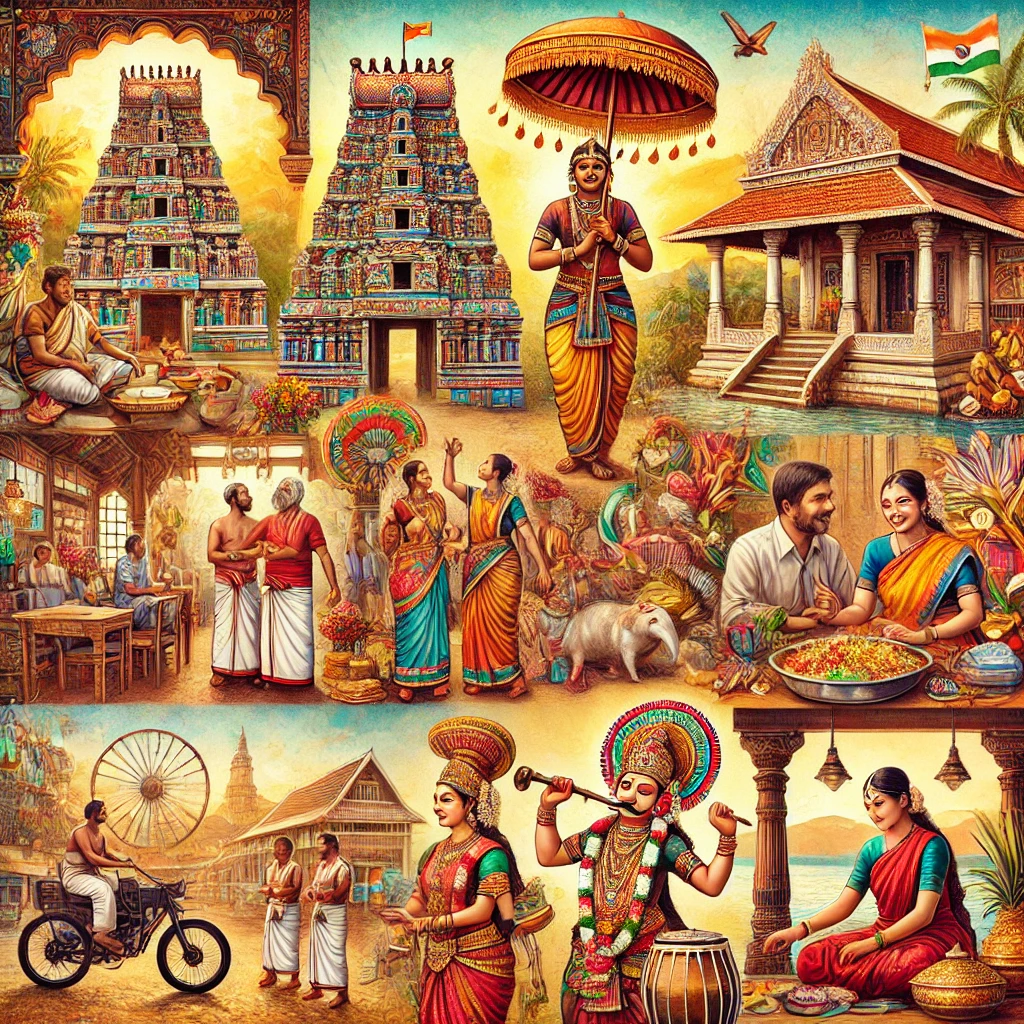Jaffna, located in the northernmost region of Sri Lanka, is a vibrant cultural hub with deep-rooted Tamil heritage, traditions, and customs. Renowned for its ancient temples, colorful festivals, delicious cuisine, and warm hospitality, Jaffna offers a fascinating journey through Tamil culture. In this post, we’ll explore the many facets of Jaffna’s Tamil culture, giving you a detailed guide to the traditions, rituals, art forms, and lifestyle that define this unique region.
Contents
- 1. Introduction to Jaffna’s Tamil Culture
- 2. Historical Background
- 3. Tamil Festivals in Jaffna
- 4. Religious Beliefs and Practices
- 5. Traditional Clothing
- 6. Tamil Cuisine of Jaffna
- 7. Jaffna Tamil Architecture and Art
- 8. Language and Literature
- 9. Folk Music and Dance
- 10. Tamil Customs and Etiquette
- 11. Conclusion
1. Introduction to Jaffna’s Tamil Culture
Jaffna's Tamil culture is an intricate tapestry woven with history, spirituality, art, and daily traditions. Jaffna has preserved Tamil heritage through centuries, making it one of the most culturally rich areas in Sri Lanka. Its vibrant customs, classical art forms, and dedication to religious observances provide a remarkable insight into the lives of Tamil people in this northern city.
2. Historical Background
Tamil history in Jaffna dates back over two millennia. Initially established as a Tamil kingdom, Jaffna became an epicenter for Tamil rulers, especially under the Jaffna Kingdom (1215–1624), which helped define the region's cultural identity. Influences from South India enriched Jaffna’s customs, language, and religion, resulting in a blend of Tamil and indigenous practices unique to the area.
3. Tamil Festivals in Jaffna
Tamil festivals are a core part of Jaffna’s cultural identity. Here are some of the most celebrated events:
| Festival | Description | Time of Year |
|---|---|---|
| Thai Pongal | A harvest festival dedicated to the Sun God, celebrated with cooking of “Pongal” (sweet rice). | January |
| Navaratri | A nine-night festival celebrating the goddess Durga, with music, dance, and worship. | September/October |
| Deepavali | The festival of lights, symbolizing the victory of light over darkness, marked by rituals at home. | October/November |
| Nallur Festival | A grand event at Nallur Kandaswamy Temple, featuring chariot processions and cultural events. | July-August |
Each festival is marked by specific customs, music, and attire, reflecting the community’s devotion and love for tradition.
4. Religious Beliefs and Practices
Hindu Temples and Rituals
The majority of Tamil people in Jaffna practice Hinduism, and the city is home to many historic temples, such as:
- Nallur Kandaswamy Temple: Known for its grandeur and annual festivals.
- Naguleswaram Temple: One of the oldest Hindu temples in Jaffna, dedicated to Lord Shiva.
Temples play a central role in daily life, with morning and evening rituals, including offerings (pujas), chants, and prayers. The community also observes Amavasai (New Moon) and Pournami (Full Moon) days with special pujas.
Fun Fact: Many people believe that participating in rituals at Naguleswaram Temple can bring good fortune and prosperity.
5. Traditional Clothing
Traditional Tamil attire is simple yet elegant, especially for religious and cultural occasions.
- Men: Usually wear a Veshti (a long white cloth tied around the waist) along with a white shirt or kurta.
- Women: Adorn themselves in vibrant sarees, with specific styles like the Madisaar for married women. During weddings or festivals, women wear gold jewelry, reflecting prosperity and tradition.
Clothing often showcases the influence of nature and is typically handwoven, emphasizing the Tamil value of sustainability.
6. Tamil Cuisine of Jaffna
Jaffna cuisine is famous for its bold flavors and spices. Here’s a look at some staple dishes:
| Dish | Description |
|---|---|
| Jaffna Crab Curry | A spicy, coconut-based curry prepared with fresh crab and special Jaffna spices. |
| Kool | A seafood broth made with crab, prawns, and vegetables, thickened with palmyrah root flour. |
| Pittu | A steamed rice flour and coconut delicacy, served with curry or coconut milk. |
| Odiyal Kool | A thick seafood soup made with smoked fish and roots. |
7. Jaffna Tamil Architecture and Art
Architectural Styles
The architecture of Jaffna is a blend of traditional Dravidian styles, colonial influences, and local ingenuity. Notable features include:
- Temples with Gopurams: Towering, intricately carved entrances.
- Colonial-Era Buildings: Influenced by Dutch and British design but adapted to the tropical climate.
- Thinnai Houses: Traditional Tamil homes with open verandahs (Thinnai), designed to promote ventilation and social gatherings.
Tamil Art and Sculpture
Jaffna’s art is characterized by sculptures of deities, traditional paintings, and woodwork, especially seen in temple carvings and chariot designs during festivals.
8. Language and Literature
Tamil is the primary language spoken in Jaffna. Literature holds an esteemed place in Tamil culture, and classical texts like the Thirukkural and Sangam literature are celebrated for their moral teachings and poetry. Modern Tamil writers from Jaffna contribute significantly to Tamil literature, often focusing on themes of identity, resilience, and spirituality.
9. Folk Music and Dance
Traditional Music
Tamil folk music in Jaffna includes instruments like the nadaswaram and thavil, often played at religious events. Classical Carnatic music also holds a special place, performed during festivals and temple ceremonies.
Dance Forms
Bharatanatyam, a classical Indian dance, is widely practiced and performed. Dance performances are integral to temple festivals, where dancers embody the stories of gods and heroes from Tamil mythology.
10. Tamil Customs and Etiquette
Tamil customs in Jaffna emphasize respect, family values, and social harmony. Here are some essential customs:
- Greeting Elders: Youngsters greet elders with respectful phrases like Vanakkam while bowing slightly.
- Marriage Rituals: Weddings are elaborate, with rituals that honor both families and invoke blessings from ancestors.
- Funerary Rites: Traditional rituals, involving family and community, honor the deceased and ensure peace for their soul.
Tamil society in Jaffna values hospitality, and guests are often treated with generosity, receiving refreshments and even meals.
11. Conclusion
Jaffna’s Tamil culture is a treasure trove of ancient customs, colorful festivals, and artistic traditions. From the bustling markets to serene temples, every corner of Jaffna reflects the beauty of Tamil heritage. Whether you’re savoring a spicy curry or witnessing a traditional dance, Jaffna offers a deeply immersive cultural experience, resonating with the spirit of the Tamil people.
Explore More: To learn more about Jaffna’s Tamil culture, you can visit TamilCulture.com or plan a visit to Jaffna and immerse yourself in its unique cultural landscape.
Embark on this journey through Jaffna’s Tamil heritage, and you’ll find that every tradition, festival, and ritual reflects a profound connection to history, spirituality, and the community.







5 Comments